Table of Contents
Electoral Bonds Full Data with Serial No Out
On March 21, the State Bank of India (SBI) announced that it had furnished all details concerning the electoral bond scheme, including unique numbers, to the Election Commission of India (ECI). This action was taken in compliance with the Supreme Court’s recent order.
Each electoral bond is assigned a distinct number, linking the purchaser to the party redeeming it. The names of both purchasers and parties involved were previously disclosed to the public in two separate lists on March 14 which is given below in PDF.
Details of Electoral Bonds submitted by SBI: Political Party Name
Details of Electoral Bonds submitted by SBI: Purchaser Name
Supreme Court Issued Notice to SBI on Electoral Bonds
The Supreme Court issued notice to the State Bank of India for not releasing bond numbers linked to electoral bonds, hindering the cross-verification of donations. Chief Justice Chandrachud highlighted SBI’s non-disclosure, emphasizing the need for transparency. The court’s earlier judgment stressed the publication of all relevant details by SBI, as voters have the right to know about potential quid pro quo arrangements between government parties and corporate entities.
Electoral Bonds Data Released
The Election Commission of India has unveiled detailed data on electoral bonds, sourced from the State Bank of India, in compliance with a Supreme Court directive. Major contributors include industrialists like Lakshmi Mittal, Bharti Airtel’s Sunil Mittal, and Vedanta. Future Gaming and Hotel Services, under scrutiny by the Enforcement Directorate, emerged as a significant donor.
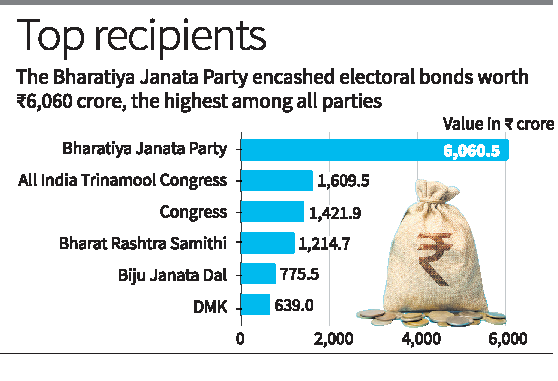
Political parties, including BJP and Congress, received donations through these bonds. The move aims to enhance transparency and accountability in political funding, shedding light on the intricacies of political finance in India. Here’s an overview of the revelations and their potential implications.
Electoral Bonds Data Highlights
The release of electoral bond data has provided crucial insights into political funding in India. Here are the key highlights from the data:
Prominent Contributors
Lakshmi Mittal, Sunil Mittal’s Bharti Airtel, and Vedanta are key contributors. Future Gaming and Hotel Services, under scrutiny, also made significant donations. Individual donors like Kiran Mazumdar Shaw and Varun Gupta are notable. Additionally, Megha Engineering from Hyderabad has contributed substantially. Various corporations such as Spicejet, IndiGo, Grasim Industries, and Piramal Enterprises have actively participated in political funding through electoral bonds.
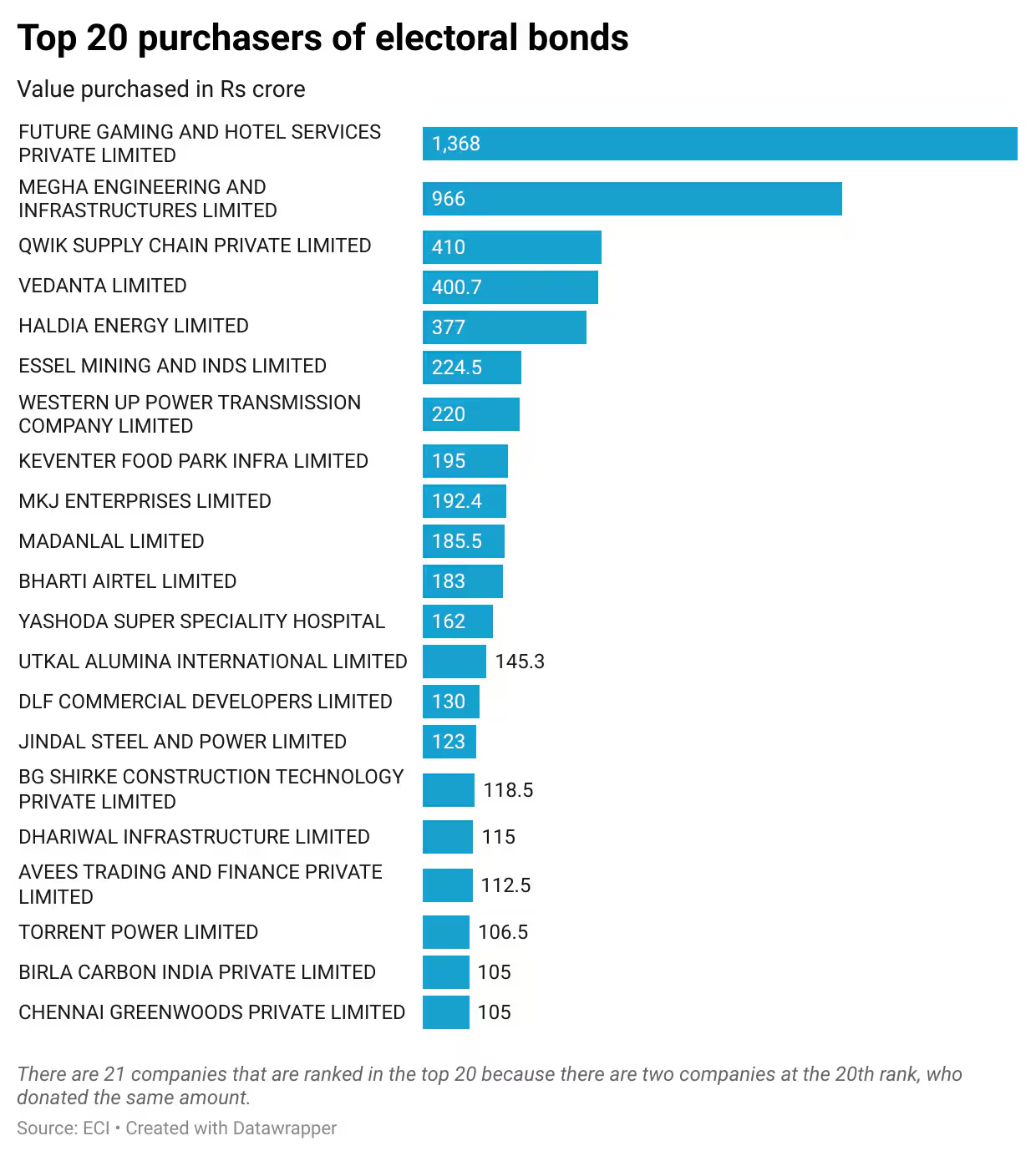
Political Beneficiaries
The BJP, Congress, Trinamool Congress, and regional parties like the Samajwadi Party received donations through electoral bonds. This distribution of funds reflects a diverse spectrum of political beneficiaries across national and regional fronts. Other recipients include AIADMK, Shiv Sena, TDP, YSR Congress, DMK, NCP, AAP, JDU, RJD, BJD, and several other parties, highlighting the broad participation of political entities in the electoral process.
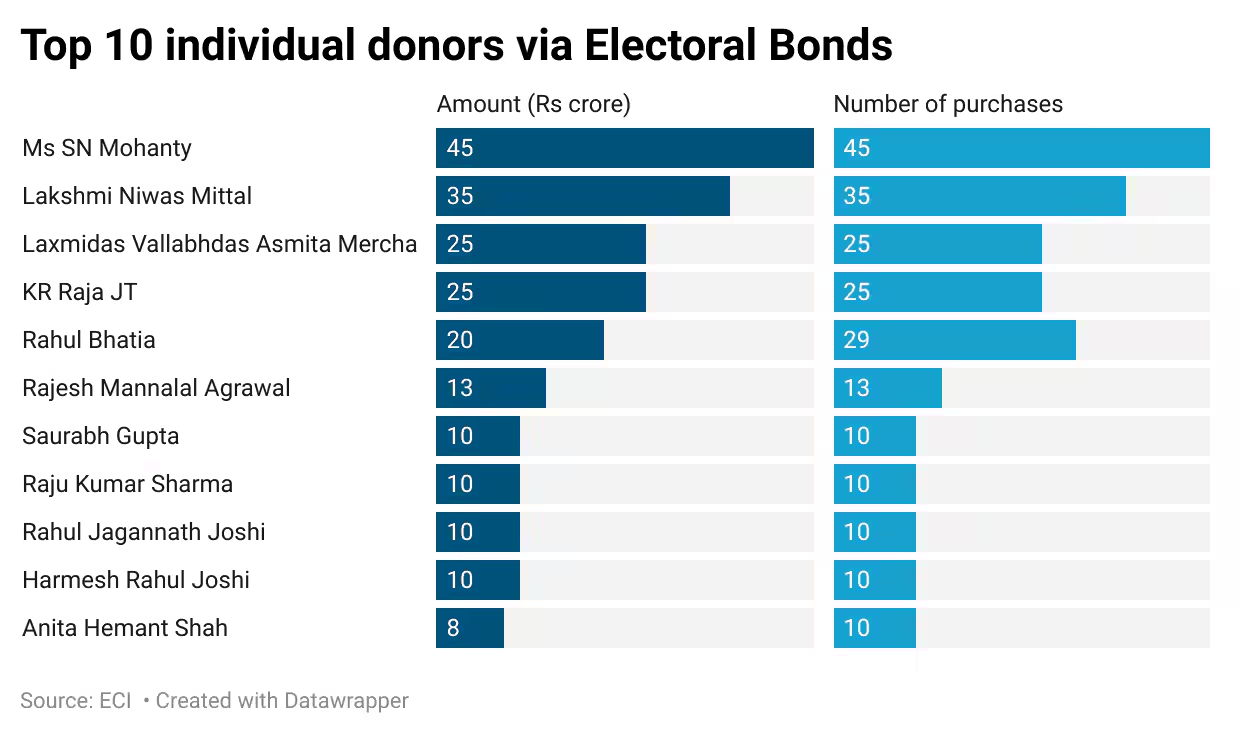
Electoral Bonds Case Timeline
| Year | Event |
|---|---|
| 2017 |
|
| 2018 |
|
| 2022 |
|
| 2023 |
|
| 2024 |
|
We’re now on WhatsApp. Click to Join
Overview of Electoral Bonds
Electoral Bonds serve as promissory notes purchasable by Indian citizens or companies from designated branches of the State Bank of India. These bonds can be subsequently donated to eligible political parties of the donor’s choice, offering a veil of anonymity to contributors. Key features include:
- Anonymity: Donors’ identities are shielded, known only to the issuing bank, ensuring privacy.
- Validity: Bonds remain valid for 15 days from the date of issuance, during which they can be donated to political parties.
- Denominations: Available in various denominations ranging from ₹1000 to ₹1 crore, allowing flexibility in contributions.
- Transparency Measures: Donations through EBs are exempted from disclosure requirements under the Representation of the People Act, 1951, raising concerns about transparency.
- Regulatory Framework: Governed by amendments to various laws, including the Representation of People Act, 1952, the Companies Act, 2013, and the Income-tax Act, 1961.
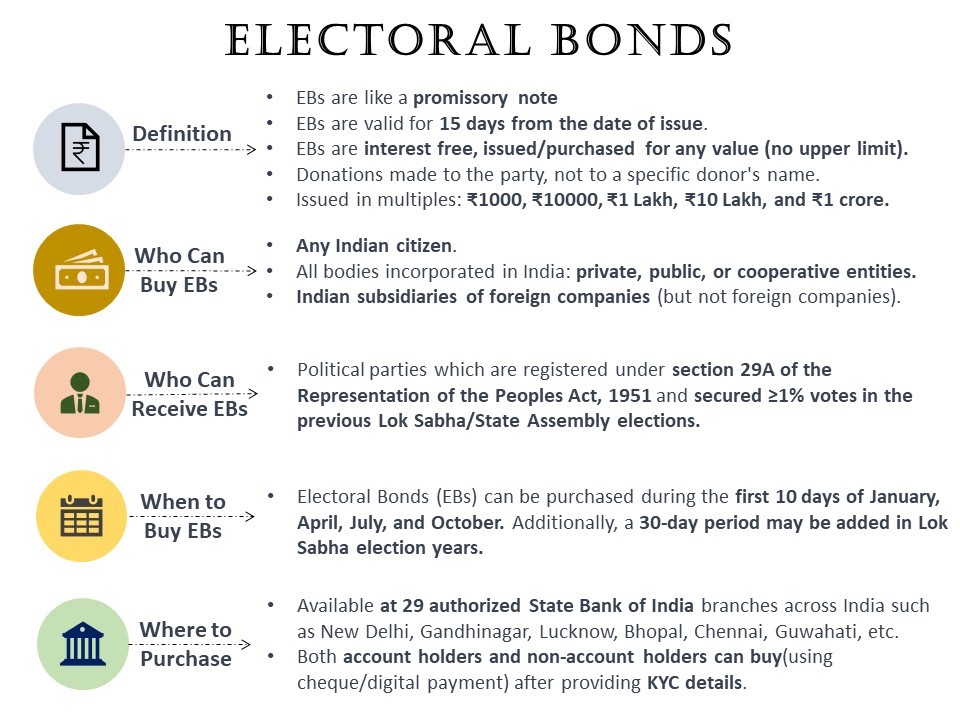
Controversies Surrounding Electoral Bonds
Despite the government’s assertions regarding the efficacy of electoral bonds in combating black money and enhancing transparency, the scheme has encountered significant criticism:
- Transparency Concerns: The anonymity of donors undermines transparency, leading to apprehensions about the influence of undisclosed contributions on policy decisions.
- Unequal Playing Field: Larger political parties, with broader support bases, stand to benefit disproportionately from anonymous donations, potentially skewing the electoral landscape.
- Impact on Democratic Principles: Critics argue that electoral bonds erode democratic principles by allowing for undue influence and unequal access to political representation.
- Risk of Money Laundering: The anonymity of transactions raises concerns about the potential misuse of electoral bonds for money laundering and other illicit activities.
- Judicial Intervention: The Supreme Court’s verdict striking down the electoral bonds scheme underscored the constitutional imperative of voters’ right to information, dealing a significant blow to the government’s stance.
Conclusion
The electoral bonds saga in India has been a journey fraught with legal battles and scrutiny. Introduced in 2017 to ensure transparent political funding, they soon faced controversy over their potential to obscure donor identities. The Supreme Court’s 2024 verdict annulling the scheme underscored concerns about its compatibility with constitutional rights. Subsequent legal actions, including pleas for extension and contempt proceedings, highlighted the challenges in implementing electoral reforms. The episode emphasizes the ongoing quest for transparent and accountable political financing mechanisms.

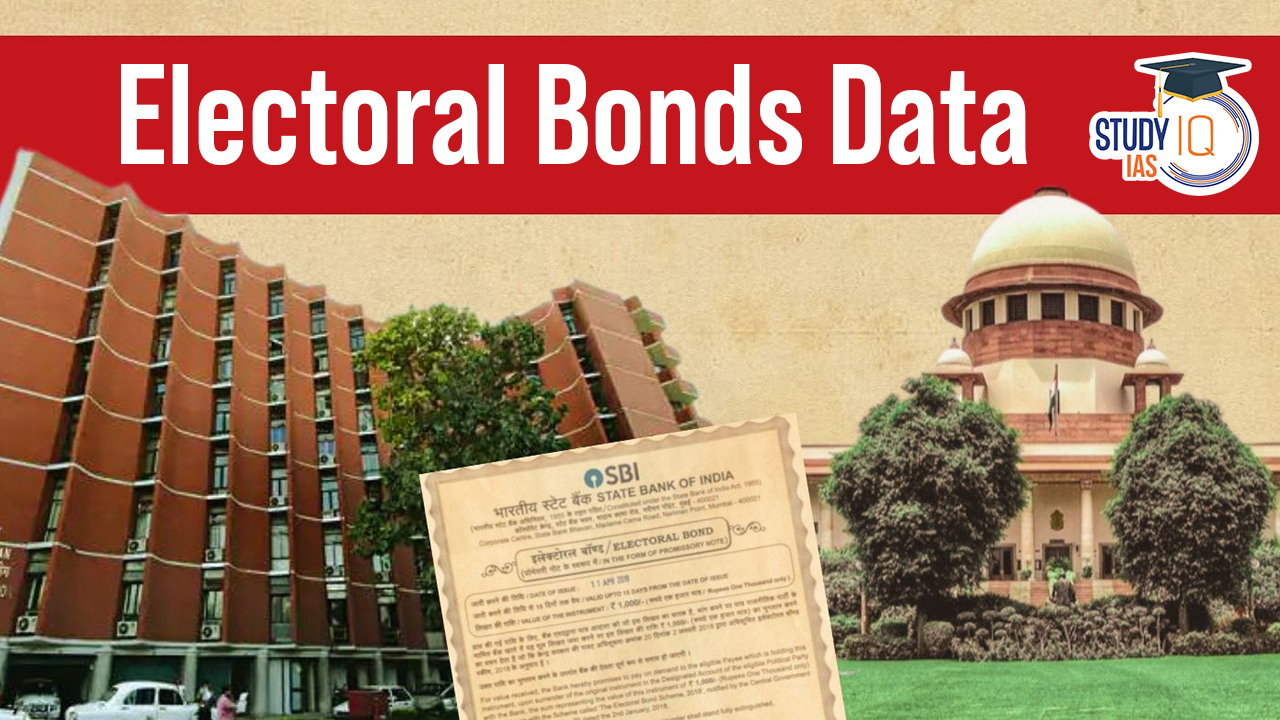
 How RBI Responded To Global Trade War Ch...
How RBI Responded To Global Trade War Ch...
 Why Confidence in US Dollar is Falling?
Why Confidence in US Dollar is Falling?
 Topological Materials: The Future of Qua...
Topological Materials: The Future of Qua...





















